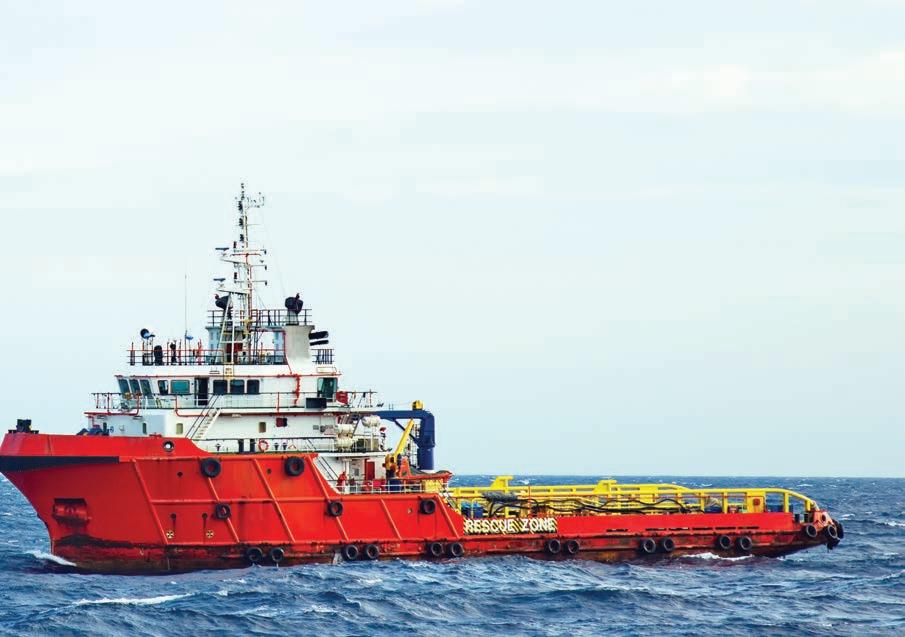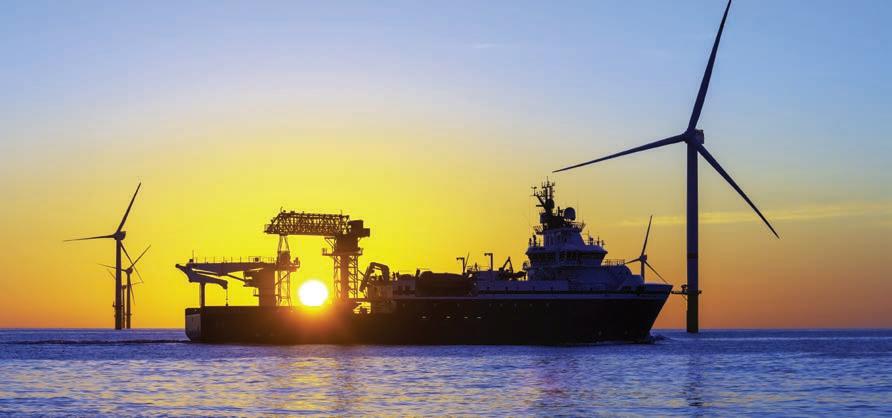
6 minute read
Transforming data into acton
Transforming data into action
Across a global feet of 400+ tracked vessels, Opsealog has already helped to deliver 80,000t of CO2 savings.
THE WAKE OF A TUMULTUOUS 2020 HAS LEFT BEHIND A NEW AND FASTCHANGING SET OF CHALLENGES FACING OIL & GAS INDUSTRY LEADERS. IN AN ERA OF ALREADY SLIM OPERATING MARGINS, THE ABILITY TO FIND EFFICIENCIES IN THE OIL & GAS MARKET HAS ONLY BEEN EXACERBATED BY THE COVID-19 PANDEMIC.
WORDS BY ARNAUD DIANOUX, CEO AND CO-FOUNDER OF OPSEALOG. ALL PHOTOS COURTESY OF OPSEALOG
At the same tme, the industry and society at large are demanding a dramatc reducton in carbon emissions. The pandemic, and the change in sentment it has triggered, has ensured that strategies for the oil & gas market are now under contnuous scrutny. This has shone the spotlight on both upstream and downstream traditonal energy markets, and their relatve value and asset longevity when compared to low or zero-carbon alternatve energy sources, including ofshore renewables. An energy transiton is inevitable. We have already seen a slump in the value of asset values and share prices of traditonal energy companies to a point where far lesser-known renewable energy companies have greater capitalisaton values than traditonal energy majors.
High potential
The queston becomes how best to navigate this energy transiton and dampen the impact of market volatlity. Not just to survive, but to build a mid-long term operatng strategy that can thrive in this new era. This starts and ends with focusing on operatonal efciencies that can protect margins and allow fnite assets to operate proftably for longer, while complying with emissions regulatons, reducing their environmental impact, and creatng a pathway to a more sustainable future. As it happens, one of the most powerful tools in our arsenal is ready and waitng. The digital revoluton has given us access to data on an unprecedented scale. But although digitalisaton ofers huge potental, just digitalising your operatons is not enough. It’s not just the data, it’s what you do with it that counts. So how can operators turn their


With the right tool, data can be visualised in a way that delivers a clear, real-time picture of the feet.
data into meaningful insights to reduce costs, cut carbon, protect margins, and improve performance?
Lessons from offshore logistics

The ofshore logistcs sector ofers valuable lessons for how this can be achieved. Opsealog works with a wide range of exploraton and producton (E&P) companies, including energy majors, natonal oil companies and regional operators, translatng their data into actonable intelligence about the utlisaton of their ofshore support vessels. Through what Opsealog describes as ‘efciency as a service’, this data enables real-tme visibility of their vessels to improve performance, cut fuel consumpton and reduce carbon and other emissions. Across a global feet of 400+ vessels tracked, we have already helped to deliver 80,000t of CO2 savings. In 2019, this equated to a 10% reducton in emissions from changes in the operatonal behaviour of these vessels by our E&P customers. We also believe an additonal 5-10% reducton can be achieved through further optmisaton initatves.
Data-driven picture
One of the frst challenges for any organisaton wantng a beter picture of their operatons is to understand their existng data tools. Many operators already have access to data that can be highly valuable, such as weather data, fow meter data and positoning data, but are not yet taking advantage of it. Opsealog’s partnership with an afliate of a leading energy major is a good example of this. The afliate had a feet of crew boats in West Africa that sufered from low-quality AIS tracking and poor connectvity. This lack of >>
Arnaud Dianoux, CEO and Co-Founder of Opsealog.
data and inaccurate reportng prevented the afliate from having a clear overview of their vessel operatons. We worked with them to fnd other data sources to complement their fragmented AIS data and build greater data redundancy.
Breaking down data siloes
We live in a data-rich era, but there is litle beneft if this data is siloed. The ofshore sector is at a digital crossroads where fragmented data and incompatble platorms prevent operators from seeing the full picture; clouded in some cases not by a lack of data, but by the sheer volume of it. Working with that same afliate in West Africa, we used our Marinsights service to process, integrate, and visualise their data in a way that delivered a single interface and a clear, real-tme picture of their feet. This has given them the accurate insights they need to optmise the utlisaton of these vessels by cutng their fuel consumpton and reducing their emissions. When talking about digital insights, a premium is ofen placed on ‘real tme’ reportng, and rightly so, partcularly compared to a legacy of daily, weekly, or even less frequent reportng. But it is important that your data platorm also enables you to take a step back to see the bigger picture. We work collaboratvely with our clients through this process, asking the right questons and recommending the most efectve way to visualise their data to build a turnkey soluton that meets their specifc operatonal needs.
Building a digital culture
For any IT project to succeed, culture maters just as much as hardware or sofware. Persuading your team to do things diferently is the challenge of building a digital culture. It requires buy-in at every level, from the boardroom to the quayside, the rig, and the vessel. Above all, everyone needs to understand ‘the why’. If they can recognise the value in driving up performance standards, reducing costs and cutng carbon, as well as how it can empower each of them in their roles, the likelihood of a successful deployment of your digital tools will be far greater. Oil & gas operators can also learn from the ofshore renewables sector. In our experience, the renewables sector is more digitally minded than their counterparts in oil & gas. In additon, perhaps because of the higher start-up costs facing renewables, they are beter atuned to the need to operate to the highest levels of efciency. Finally, as a younger sector with less of an ‘analogue legacy’ to overcome, they have been more willing to embrace the use of data when it comes to the opportunites in the fast-growing renewables market.
The COVID-19 pandemic
If there is any silver lining to the pandemic, it is that even those reluctant about digital adopton have taken important steps in this directon. As travel restrictons and home working became the norm for many of us, we instead leaned on digital and remote working technologies. This provided a degree of agility that surprised many, as data-driven technology proved its value as an aid to decision-making, even at a distance. For example, a customer that was grounded in Europe due to the travel ban was able to manage their ofshore feet in Nigeria just as efectvely. Digitalisaton is a journey that takes tme, but there are important gains that can be secured quickly. Partcularly for the oil industry, good data management can provide immediate insights to protect the oil margin and ensure that operatons remain proftable, even in a tough market. It has been said that ‘data is the new oil’. One thing that is certainly true is that the smart use of data in improving operatonal efciencies has a vital role to play in helping ofshore operatons meet the increasing demands placed upon them, delivering proftability, extending asset life, increasing asset value, while complying with carbon and other emissions’ regulatons.
i. opsealog.com











